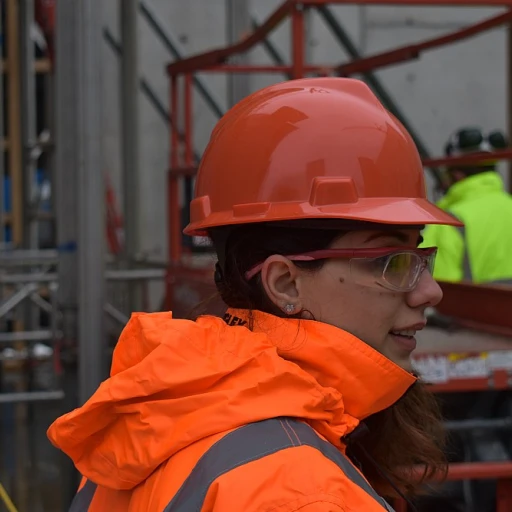
Understanding the Role of an HR Operations Specialist
Recognizing the Core Responsibilities
An HR Operations Specialist plays a pivotal role in the overall structure of any company. Their job revolves around managing a variety of human resources tasks that ensure the smooth functioning of employee-related operations. Understanding the responsibilities outlined in the job description helps hiring managers identify the skills needed in a candidate. Key tasks often include overseeing employee relations, managing company policies, and ensuring compliance with labor laws and regulations.
This role requires a strong understanding of what it takes to successfully run human resources functions and support the larger HR team. Beyond these tasks, operations specialists often serve as a business partner to the management, fostering a healthy workplace environment and championing diversity and inclusion. The experience gained in this role can be instrumental in addressing issues related to employee engagement and problem-solving.
It’s crucial during the interview process to establish how well an applicant understands these responsibilities. Asking pertinent interview questions gives hiring managers the ability to assess a candidate’s ability to fill these significant shoes. It's not just about finding someone who knows the operations but also someone who fits into the company’s culture and dynamics, which will be crucial when diving into behavioral and situational questions.
For more information on who is responsible for different aspects of conducting interviews in HR, read this insightful article on conducting interviews in HR.
Key Competencies to Evaluate
Crucial Skills to Assess for Success
When interviewing potential HR Operations Specialists, identifying key competencies is essential. These skills not only relate to the specific role but also to the broader dynamics within the human resources domain.- Problem-Solving: HR Operations Specialists must often tackle complex issues. This entails evaluating a candidate's ability to identify problems, analyze the situation, and implement viable solutions effectively.
- Understanding of Laws and Regulations: Since this role involves adherence to various labor laws and company policies, a strong grasp of relevant legal frameworks is vital. Candidates should demonstrate their knowledge of these issues during the interview.
- Technical Proficiency: An understanding of HR systems, data reporting tools, and other technologies pertinent to human resources operations is crucial. Candidates should be able to articulate their experience with these tools, offering samples of how they have applied them in past roles.
- Communication and Employee Relations: Effective communication skills are necessary for HR Operations Specialists to manage employee relations and maintain engagement. They must be able to work as a business partner and effectively mediate between managers and employees.
Behavioral Interview Questions
Unveiling the Past: Behavioral Understandings
Behavioral interview questions are instrumental in assessing a candidate's alignment with the competencies and expectations laid out in the HR operations specialist role. These questions provide insight into an applicant's problem-solving skills, decision-making capabilities, and adaptability to the company's specific needs. Behavioral questions often delve into a candidate’s past experiences to predict future performance. By exploring previous scenarios, hiring managers can gain an understanding of how a candidate may act in future, similar situations.- Question: "Can you describe a time you successfully implemented a new policy or process? What was your approach?"
- This addresses the candidate's experience with change management and strategic thinking.
- Question: "Tell me about a time when you had to deal with a significant conflict in your team. How did you handle it?"
- Conflict resolution skills and employee relations experience are key here.
- Question: "Describe a situation where you had to ensure compliance with labor laws and regulations. How did you manage it?"
- This question highlights understanding of laws regulations and commitment to upholding company policies.
Technical and Situational Questions
Technical Proficiency and Problem-Solving Skills
When interviewing for an HR Operations Specialist role, it's crucial to assess the candidate's technical skills and their ability to handle complex situations. This section of the interview should focus on understanding how the candidate approaches problem-solving and their familiarity with relevant tools and systems.
Here are some sample interview questions to consider:
- What HR software systems have you worked with in previous roles?
This question helps gauge the candidate's technical experience and adaptability to new systems. A strong answer will include specific software names and examples of how they used these tools to improve HR operations. - Can you describe a time when you had to solve a complex HR problem?
This question assesses the candidate's problem-solving skills and their ability to think critically under pressure. Look for a structured approach in their answer, highlighting the steps they took to resolve the issue. - How do you ensure compliance with labor laws and company policies?
Understanding and adhering to laws and regulations is vital for an HR Operations Specialist. The candidate should demonstrate knowledge of relevant laws and how they apply them in their work. - Describe a situation where you had to implement a new HR process. What was your approach?
This question evaluates the candidate's project management skills and their ability to drive change within an organization. A comprehensive answer will include planning, execution, and evaluation stages.
These questions aim to uncover the candidate's technical expertise and their ability to apply it effectively in real-world scenarios. As you evaluate their responses, consider how their skills align with the job description and the needs of your company.
Cultural Fit and Team Dynamics
Cultural Synergy and Team Integration
When assessing candidates for the HR Operations Specialist role, it is important to evaluate their ability to blend seamlessly with diverse company cultures and team environments. Human resources operations are greatly influenced by the unique culture of a company, and an employee’s adaptation to this culture can largely impact their success and productivity. Understanding how a candidate approaches cultural fit can provide valuable insight into their overall compatibility with the team dynamics. Consider asking questions that reveal how the candidate handles diversity and inclusion within the workplace. A specialist interview may involve questions like:- Can you describe a time when you worked in a diverse group of people? What was your role and how did you ensure effective collaboration?
- How do you promote employee engagement and ensure every team member feels valued, regardless of their background?
- How do you handle disagreements among team members and ensure resolutions align with company policies?
- Can you provide a sample scenario where you facilitated a successful change in team processes to improve productivity?
Evaluating Responses and Making Decisions
Assessing Candidate Responses
Evaluating the responses of candidates during an interview goes beyond listening to their answers. It's about understanding how well these responses align with the expectations outlined in the job description for a Human Resources Operations Specialist. For hiring managers, the key lies in identifying candidates who demonstrate a strong blend of skills, experience, and an ability to adapt to the company policies and culture.- Problem Solving Skills: Look for answers that show a candidate's aptitude in critical thinking and labor laws knowledge, particularly as it relates to human resources operations.
- Behavioral Insights: Analyze how candidates describe past scenarios. Their interactions in a team setting and their approach to diversity inclusion typically reflect their potential for fostering employee engagement and relations.
- Technical Proficiency: Evaluate the candidate's ability to address technical questions directly related to human resources systems, company policies, and business partner dynamics. Answers should reveal a specialization in handling complex operations processes.
- Cultural Compatibility: Examine how well candidates could fit into existing team dynamics. This involves not just knowledge but their perception and approach to human communications within a workplace setting.






